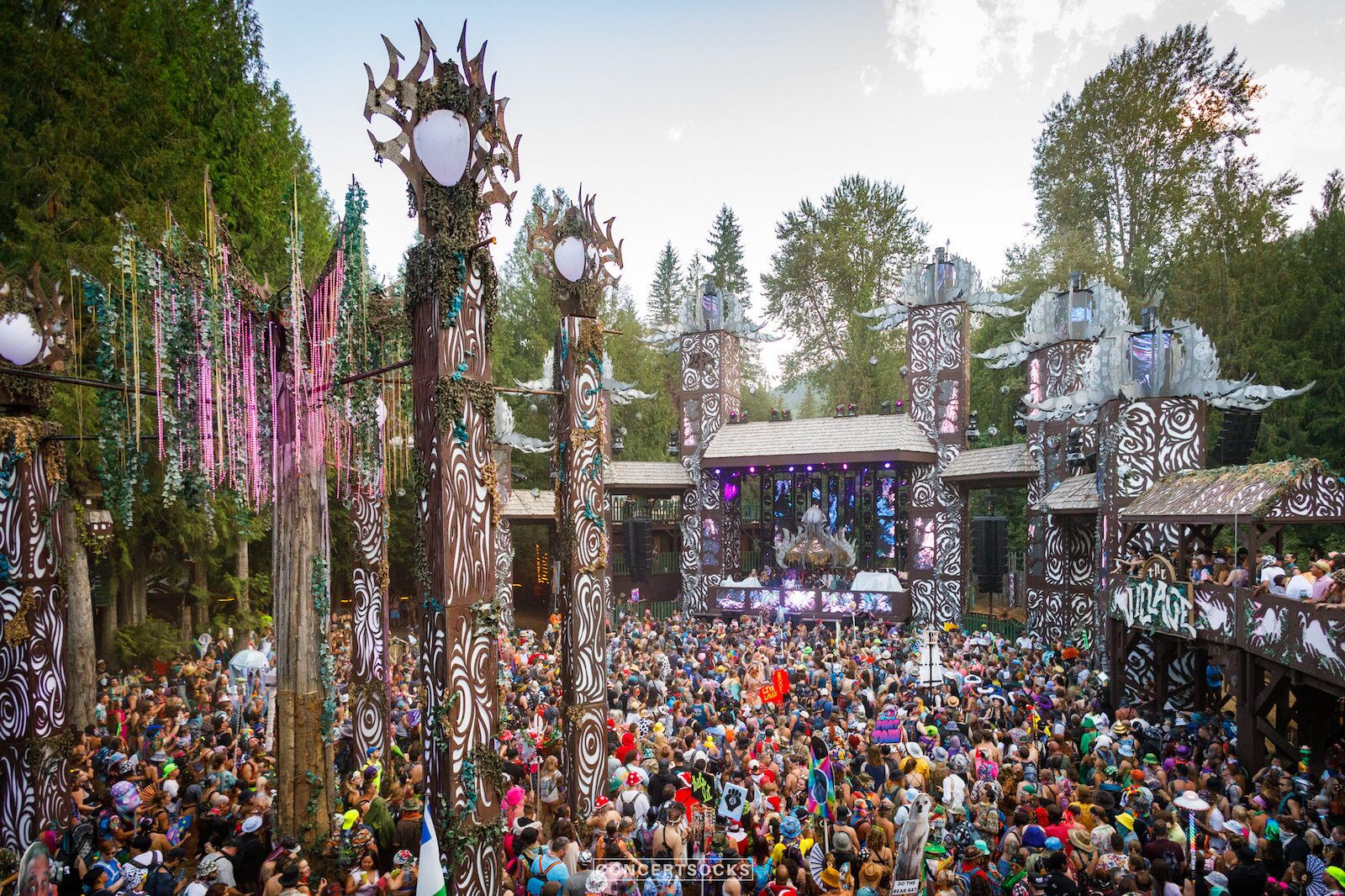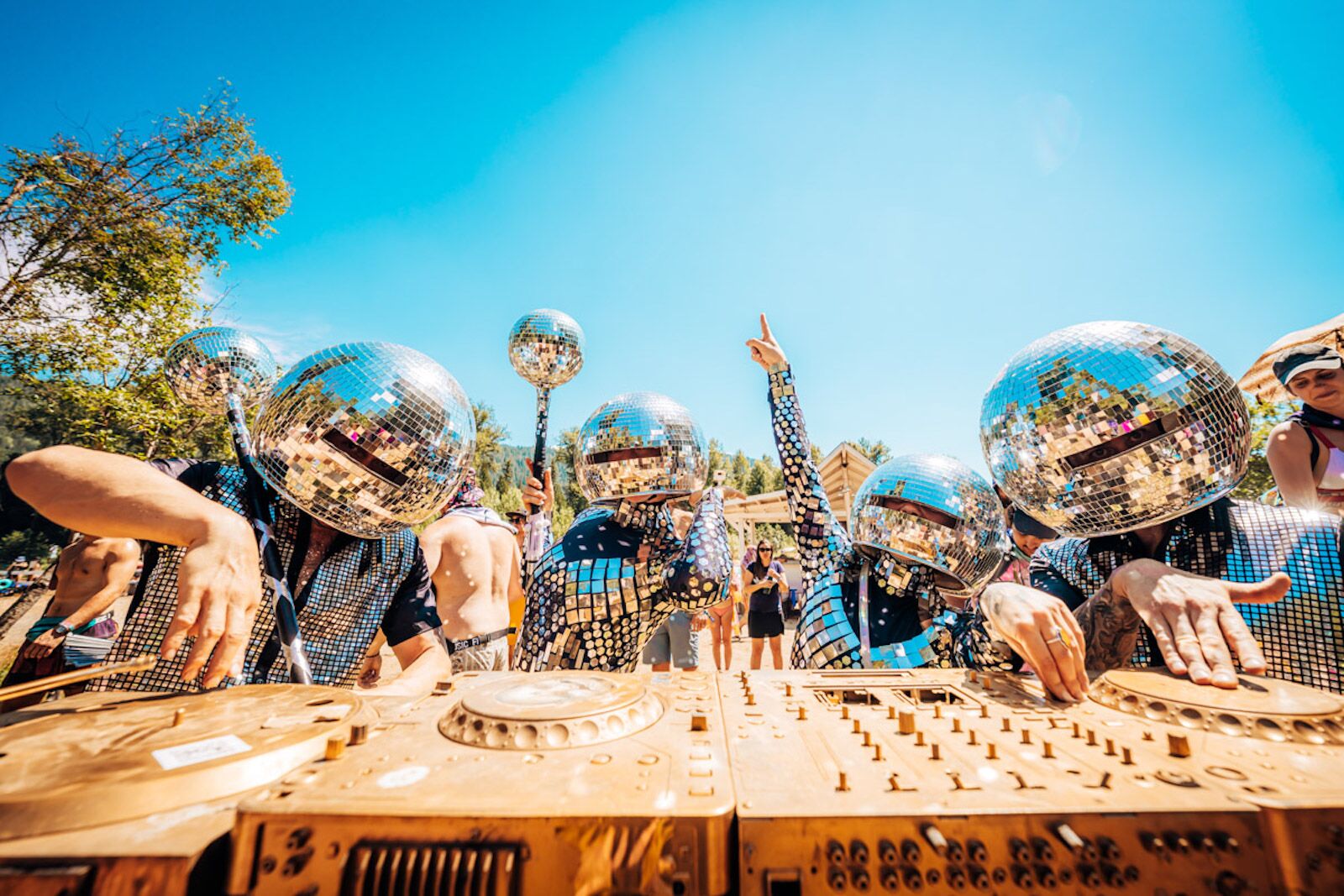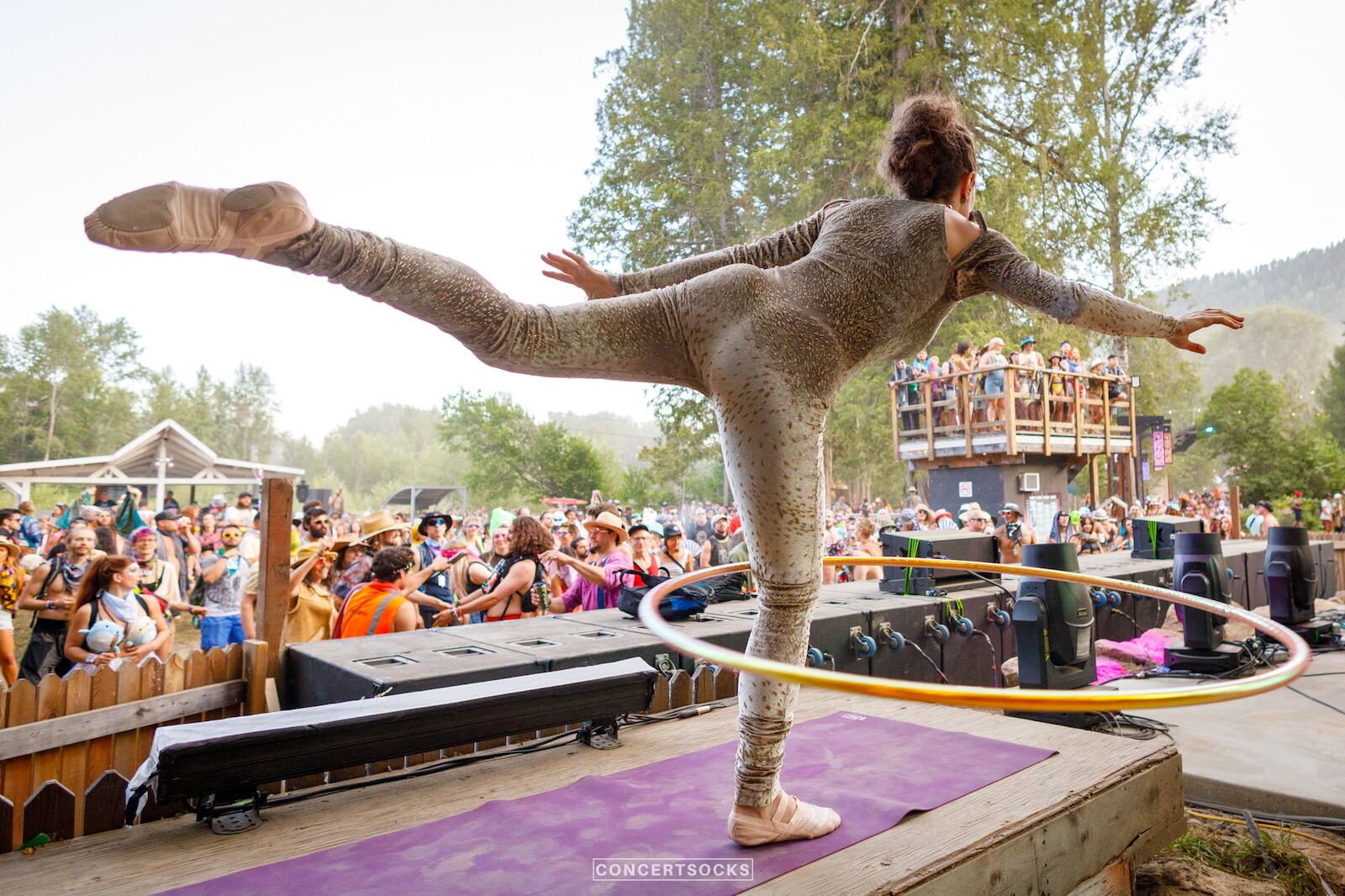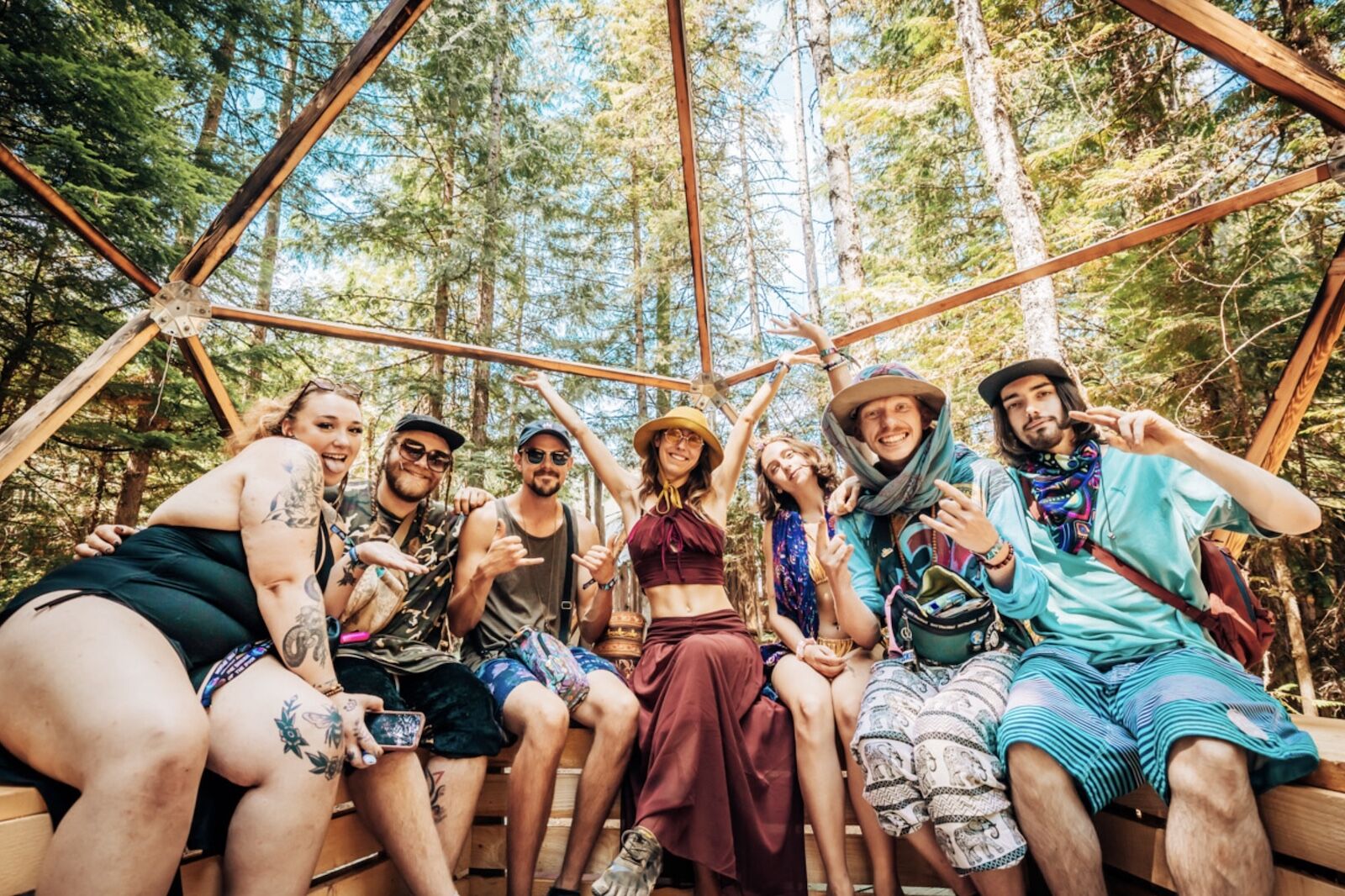Tee-totaling sobriety and multi-day music festivals don’t usually go hand-in-hand. For me, the thought of dancing for 10 or more hours to pulsing music in a dust-choked crowd beneath the beating sun without a cold beer in hand could be classified as torture. But alcohol-free, or sober, music festivals exist, and they draw tens of thousands of concert-goers to remote corners of the globe to revel in music without the added risks of intoxication.
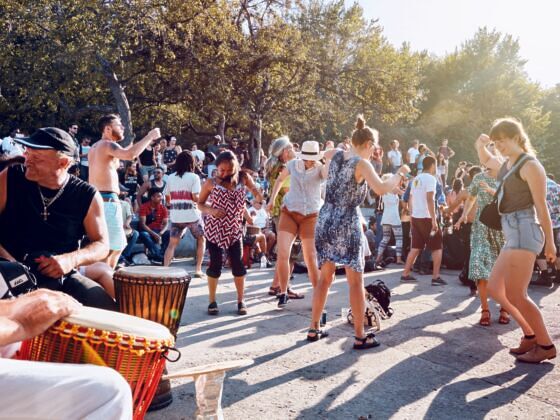

Sober Music Festivals: Where and How to Party Alcohol-Free
To see what the lack of buzz was about, I attended the 2024 Shambhala Music Festival in Salmo, in Canada’s province of British Columbia. It’s a hippie extravaganza that strictly bans the consumption of any and all alcohol; you can’t bring, buy, or consume it while staying on the 500-acre farm. This four-day musical bender was shockingly freeing, proving that adults don’t always need alcohol to fuel their fun.
If you’re looking for all of the party and none of the booze, then this is the festival for you. Because while the farm and forests of Shambhala were indeed dry, the iconic EDM festival was far from family-friendly.
What it’s like to attend a sober music festival
Shambhala has bumped dirty beats in the fractal forest for 25 years, becoming a cult-favorite festival in the electronic dance music, or EDM, scene. The production quality is excellent, and top artists in the genre are always in attendance. Music pulses through the night into the post-dawn hours, and daytime events include blindfolded yoga, drum circles, breath work, and river floats in the icy Salmo River.
The only thing missing is the alcohol. It’s seized during thorough car searches before the festival and dumped unceremoniously into a giant communal vat (not for consumption, unfortunately). Each day, I awoke exhausted, but notably, ready to hit the dance floor again. I wasn’t deathly hungover — a welcome change from the music festivals of my past.
Though the festival’s rules also ban any substances illegal in Canada (which technically includes all hallucinogenics), it appeared that most of the attendees chose to forgo alcohol for more psychedelic adventures. Shambhala is known for for pioneering harm-reduction services for festivals in Canada, and it seemed that recreational substances better suited the sound healing classes, transformative yoga sessions, and pulsating drum-and-bass dance parties that dominated the seven stages throughout the weekend. Shambhala also offers free drug purity testing and advice from Ankors, a women’s safe space, and a carefully monitored sanctuary for those who might be struggling on their psychedelic journeys.
Attendees who want a genuinely sober event can hang out in the section of the campground called Camp Clean Beats. It’s a secluded area catered to fully sober festival-goers — people who want to hang out and enjoy the music without drugs or alcohol of any kind. Camp Clean Beats also hosts recovery support meetings throughout the weekend.
During my time at Shambhala, I noticed quite a few differences between sober music festivals and most others.
For one, the audience showcased a diverse spectrum of humanity, not just festival bros. This may be one of the reasons Shambhala attracts people from all over North America every year. You can let your freak flag fly, but there’s none of the stereotypical, egotistical showboating associated with mainstream concerts, like Coachella. The festival doesn’t even allow mainstream sponsors, reserving its vendor slots for local small businesses.
Festival attendees seemed to watch out for one another. There were no alcohol-fueled fights and fewer haggard, staggering, or overly intoxicated people, and I frequently chatted with others in the crowd. People asked how I was doing, offered me snacks, and checked in on strangers around them.
But that’s not to say it doesn’t get wild, and you’re just as likely to see someone walking around fully nude as you are to see them in an elaborate technicolored costume. There was even a clan of animal-suited furries dancing in the crowd. The outfits I saw were elaborate, often themed after the stage the festival-goer felt most drawn to, like the line of people wearing lampshades at the Living Room Stage.
Organizers of the Shambhala festival say they don’t want to add alcohol due overdoses, drug interactions, dehydration, and the risks overly indulgent patrons can pose to themselves and others. It also causes broken glass: a big no-no at festivals, especially on a fully functional farm.
But attendees told me what mattered most to them was maintaining the tight-knit community feeling, and that alcohol could draw in a crowd that doesn’t share the free-spirited values of the festival itself. While I’m never opposed to the experience-enhancing effects of a chilled bottle of wine, I enjoyed my experience at the sober music festival, even though I thought I wouldn’t. Spending my days lounging by the river and my nights dancing beneath the laser lights was an excellent way to embrace the weirdest and wildest parts of myself.
While Shambhala might be the most prominent sober music festival to strictly adhere to the dry-party policy, it’s certainly not the only one. Here are four other festivals that don’t allow liquid courage on the dance floor.
Soundstorm, Saudi Arabia
Soundstorm happens annually in Riyadh, Saudi Arabia, and is the largest and most luxurious electronic music festival in the Middle East. Alcohol has been illegal in Saudi Arabia since 1952 — not just at music festivals, but throughout the country. That effectively makes every music festival in Saudi Arabia a sober music festival, but Soundstorm is still unique. The three-day cultural event has eight stages blending various musical genres; past headliners include Eminem, 50 Cent, Calvin Harris, Will Smith, Black Eyed Peas, Metallica, and David Guetta.
As with all other elements of Saudi Tourism, extravagance and elegance are key. Soundstorm pushes the envelope in stage production, big-name headliners, and attendance, with 2022’s festival topping 600,000 sober festival goers. The three-day festival happens every December, and is generally considered to be as impressive and high-budget as you’d expect from a country with a development vision as futuristic as Saudi Arabia’s.
Into the Wild, United Kingdom
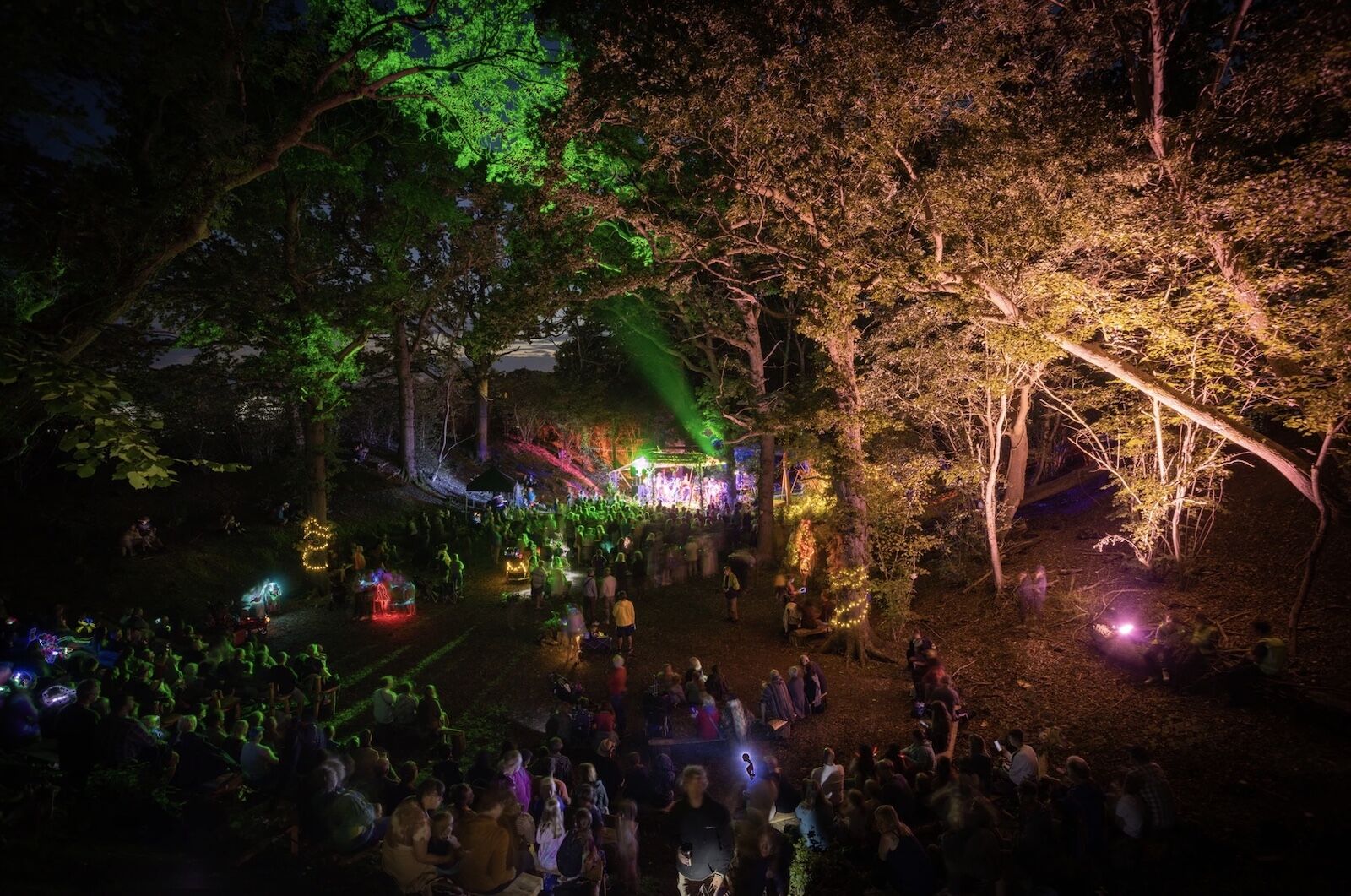
Photo: Into The Wild Gathering
The sober music festival and gathering known as Into the Wild is held on the grounds of an 18th-century estate in Sussex, England, under dark skies and surrounded by meadows and forests. It’s the kind of place where you expect to find professional foragers, barefoot and hemp-clad families, dreadlocked nature enthusiasts, and far more kombucha than beer.
Into the Wild is a multi-day music event, but there’s more to it than that – and thankfully so, as you won’t see any big, or even recognizable, names here. Instead, the music matches the bohemian vibe of the festival. The absolute joy is in workshops ranging from grass basket weaving, wild paint making, Yoga & Chi Gung sessions, herbal medicine-making, geodesic dome building, firestarting and knife-sharpening classes, archery, and more. The all-ages-encouraged environment with plenty of kid-friendly entertainment makes the gathering uniquely suitable for all ages, with many family activities. The festival brands itself as a place where attendees can be themselves, no matter how weird and wacky that self may be.
The four-day festival is held every August and is roughly 90 minutes south of London. Most attendees camp on-site, though you can also stay in nearby small towns or rent more luxurious yurts and dome tents. Note that alcohol isn’t technically banned — it’s just not sold. As the event page says, “BYO is fine, but it is not a major part of our culture.”
Buddhafield Festival, United Kingdom
If you are a regular attendee of Glastonbury, the name “Buddhafield” might ring familiar. The Buddhafield Cafe, a roomy vegan lunch tent with regular meditation workshops, is an annual Glastonbury vendor and host of its own multi-day music festival nearby. Unlike Glastonbury, however, the event is 100 percent alcohol- and drug-free.
Buddhafield Festival organizers say the aim is to create an all-inclusive space where festival-goers can feel safe, explore new experiences, and enjoy genuine connections with the other attendees and the natural world. It helps facilitate that via live music, dancing, and various workshops on subjects like “compassionate activism” or the overlap of Buddhism and ecology. There are also several stages with dozens of DJs and live musicians throughout the five-day festival. It’s held every July, and while many of the offerings are based on Buddhist ideas, you don’t need to be Buddhist, or religious in any way, to attend.
Bhakti Festival, California
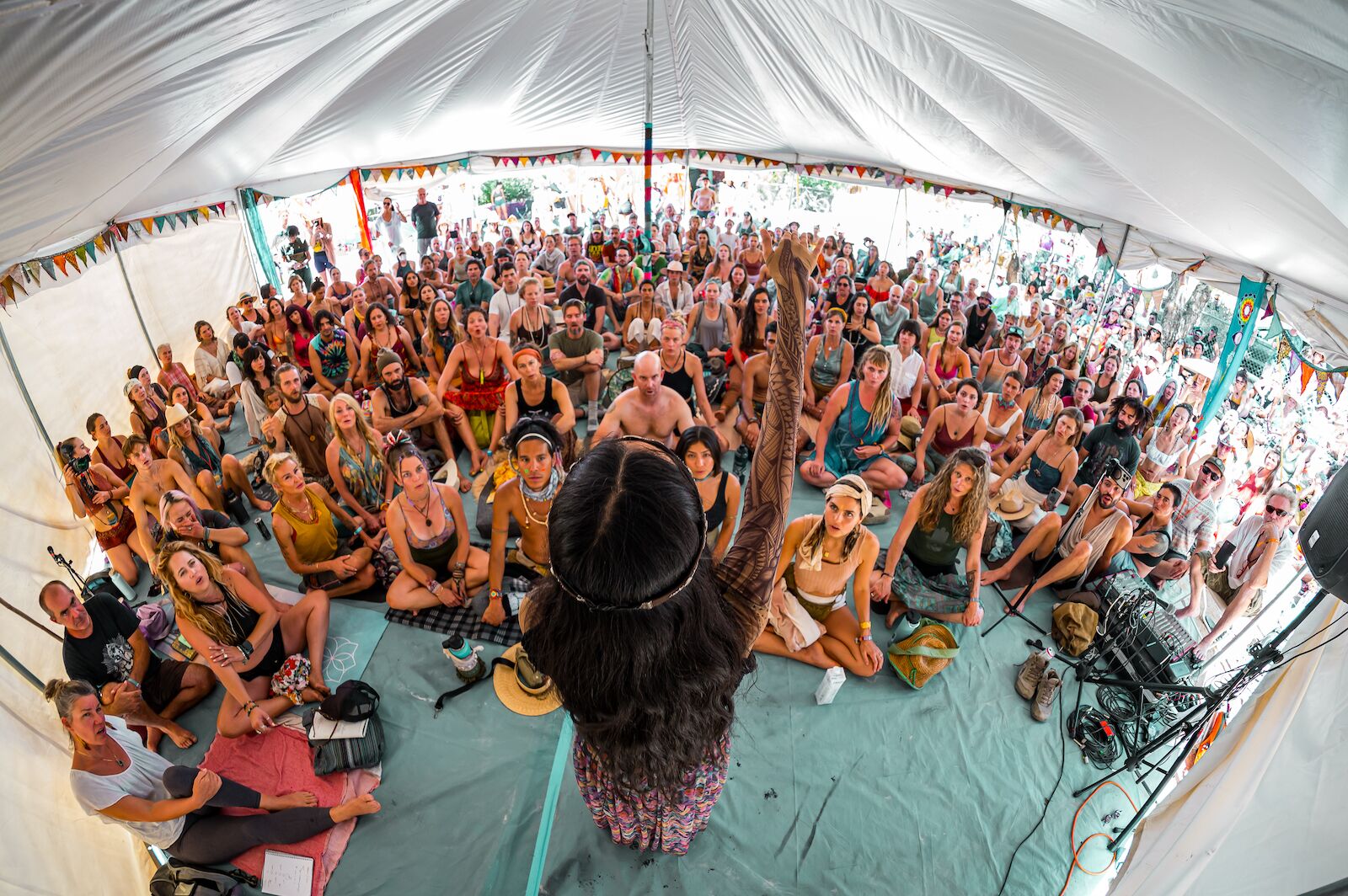
Photo: BhaktiFest/@EricAllenPhoto
Set in the arid, high desert of Joshua Tree, CA, among the whimsical and Seussian cacti, Bhakti Fest brings yogis together in an environment somewhat like a mini Burning Man. But the five-day New Age festival filled with ecstatic dance, yoga and meditation, vegan food, and musical acts ranging from EDM to reggae actually has its roots in Woodstock.
The creator of the Bhakti Festival, Sridhar Silberfein, worked with friends Michael Lang and Artie Kornfeld in the 1960s. Music aficionados may know those two names as producers of the original Woodstock festival in New York. Silberfein was also a student of the renowned guru Swami Satchidananda, who spoke to the crowds of 500,000-plus on that fateful day in 1969.
While the free-spiritedness of Woodstock lives on today at Bhakti Festival, one thing that is different are the rules. Bhakti is a fully sober music festival, shunning Woodstock’s drug and alcohol culture to create a safe space for all attendees. It’s held toward the end of September every year, though the organizers also host longer retreats throughout the year in other destinations.
